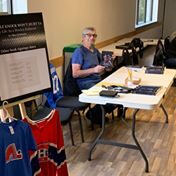When Allan Globensky — Captain Crunch — was playing hockey in the 1970s, it was a different game.
As an enforcer, he was the player who was sent in to start a fight or end one.
It was a hard life, knocking around between the World Hockey Association’s Quebec Nordiques and its minor league affiliate, the Maine Nordiques, based in Lewiston.
The years of fights have taken a toll.
Now 68, Globensky has published a memoir, “A Little Knock Won’t Hurt Ya!” And and from 11 a.m. to 1 p.m. Saturday and Sunday, he will be signing copies at the Camden National Bank Ice Vault in Hallowell.
In the prologue of his book, Globensky makes the point that for every standout player like Guy LaFleur, Wayne Gretzky or Bobby Orr, there have been thousands like him who make a career with the skills they have, and it is not an easy road to take.
He will tell you he suffered between 60 and 65 concussions during more than 90 fights over the course of a decade, taking repeated punches to the head.
“They call them mTBI, mild traumatic brain injury,” Globensky said, from his his home in Canada earlier this week. “I call them brain bruises.”
The impact of those repeated impacts is largely unknown. Globensky said he has been to countless specialists to try to understand what is ahead for him.
He knows what is behind him, in periods of struggle, addictions and deep depression.
Some are from his time in hockey and some from his time as a firefighter in Auburn. He was one of the Auburn firefighters to respond in 1984 to the home of John Lane and Cynthia Palmer to find Palmer’s daughter dead in the oven.
But in decades after he left hockey, he also knows that there have been moments of light, where opportunities surfaced and friends extended a hand.

Allan Globensky, former hockey player and Kennebec Ice Arena manager, has written a book, “A Little Knock Won’t Hurt Ya!”
One of those, he said, Peter Prescott, who offered him a part-time job managing the Kennebec Ice Arena, after seeing some of the hockey clinics Globensky had put on.
Dick Rogers, who coached hockey and ran a hockey league, first met Globensky when Rogers’ son got involved in hockey.
“Al brought everything into reality for most people,” Rogers said. “As much as he promoted the sport of hockey, he was a big proponent of letting kids be kids. He did that very well.”
Rogers said Globensky was good at giving the life lesson that whatever happens on the ice, you have to endure. If the ref calls a penalty, he said, the answer is not to get upset, it’s to score a goal.
Globensky has long been a critic of violence in hockey, and said the game today is far different from when he played, a period that he described in his book at bordering on insanity.
As more and more becomes known about chronic traumatic encephalopathy, a progressive and degenerative disease of the brain that’s often found in athletes, Globensky continues to speak out against fighting in hockey, and his book is another avenue for that.
For every famous athlete whose death is linked to some sort of sustained traumatic brain injury is widely reported in the media, he said, there are so many more athletes in the minor leagues who are never heard about.
A portion of the proceeds from all book sales will help support the Skating Association of Maine. The association, with more than 300 members, is a nonprofit organization that encourages and promotes ice skating programs in Maine.
Send questions/comments to the editors.



Success. Please wait for the page to reload. If the page does not reload within 5 seconds, please refresh the page.
Enter your email and password to access comments.
Hi, to comment on stories you must . This profile is in addition to your subscription and website login.
Already have a commenting profile? .
Invalid username/password.
Please check your email to confirm and complete your registration.
Only subscribers are eligible to post comments. Please subscribe or login first for digital access. Here’s why.
Use the form below to reset your password. When you've submitted your account email, we will send an email with a reset code.